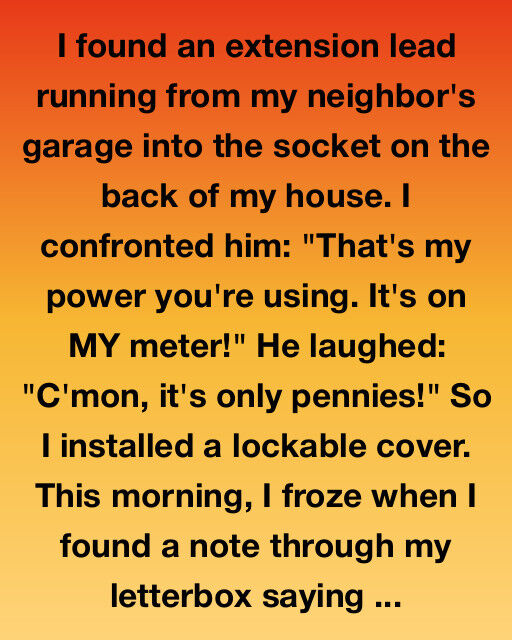We all have neighbors, and sometimes, those relationships can be complicated. This is a story about a small electrical cord that ended up teaching a big lesson about kindness, community, and opening up when things get difficult.
The whole thing started when I discovered an extension lead running right from my neighbor’s garage and plugged into a socket located on the outside wall of my house. I was shocked.
I went straight over and confronted him. “That’s my power you’re taking,” I said firmly. “It’s running on MY meter!” He simply laughed it off, trying to make it seem like a small thing. “C’mon, it’s only pennies!” he chuckled. Despite his casual attitude, I was upset. It felt like stealing, no matter how little electricity it was. So, to stop it from happening again, I went out and installed a lockable cover over the outdoor socket.
The Note and the Guilt
The very next morning, I found a piece of paper slipped through my letterbox. The message immediately made me freeze. It simply said: “You’re colder than your electricity, mate.”
I stared at the note for a long time. At first, I felt a rush of anger—I wasn’t the one who was taking power! Then, I felt confused. But strangely, after a while, I started to feel a prickle of guilt.
I couldn’t explain why. I was right to protect my property. Yet, those words, especially the word “mate” at the end, hit me hard. We used to be friends, or at least friendly neighbors.
Ron’s Story
My neighbor’s name was Ron. He had been next door for about ten years. He was always busy in his garage, fixing up old things: radios, bicycles, and furniture. A few years back, he had gone through a terrible loss when his wife, Maureen, passed away from cancer. After that, Ron had become very private and kept to himself most of the time.
Before Maureen died, we had a more typical neighbor relationship. We’d have a barbecue in the summer or lend each other our tools, like the lawnmower. But after he lost his wife, Ron seemed to shrink away, staying in his garage and shutting the world out.
I tried to keep the connection going. I knocked on his door a couple of times with extra food—a bowl of soup or a slice of pie. He always said thank you, but he never invited me inside.
When I saw that extension cord running from his garage last week, I lost my patience and snapped. My first thought was, “That’s enough. I’m not a charity for a grown man.” I didn’t stop for one second to think about why he might desperately need the power. I just went and bought the lockable cover and screwed it tightly onto the wall.
And now, there was this note: “You’re colder than your electricity, mate.” I put it in my pocket, trying to ignore it, but the feeling stayed with me all day, like a small, sharp pebble in my shoe.
Discovering the Truth
That evening, I glanced out my kitchen window. Ron’s garage was completely dark. It had been that way for a few nights. His lights were always dim, but now, it was pitch black. There was no movement and no sound of his old radio crackling in the background.
A very uneasy feeling settled over me, so I walked over to his house. I knocked. No answer. I called out his name. Still nothing.
Then, I peered through the small, frosted window of the garage and saw him—lying on the floor.
I quickly climbed the fence and rushed inside. Luckily, the door was unlocked. He was breathing, but just barely. I immediately called for an ambulance.
It turned out Ron had diabetes. He had not been eating properly. He confessed that his refrigerator had broken down a week earlier, and he didn’t have the money to fix it. Worse yet, his electricity had been cut off completely. That’s why he had run the extension lead to my house. He didn’t want to tell anyone because he didn’t want to feel like a burden to his neighbors.
The paramedics made it clear that if I hadn’t checked on him when I did, he might have slipped away.
That night, I sat at home, staring at the blank TV screen. My chest felt tight. I realized that I hadn’t just locked the power socket; I had also, in a way, locked him out of my life and my concern.
Reconnection and Repair
A few days later, after Ron was released from the hospital, I went to visit him. I brought groceries and a small portable heater.
He didn’t speak much at first. He just nodded and quietly said, “Thanks.”
I knew I needed to say something more. “I’m sorry,” I told him.
He looked surprised. “For what?” he asked.
“For not asking,” I replied honestly. “I could’ve helped.”
Ron sat back in his chair. “It’s not your job to help, mate,” he said.
“No,” I agreed. “But I should’ve anyway.”
He gave a small, tired smile. “Well, thanks for unlocking that part of you.” We both shared a brief, nervous chuckle.
In the weeks that followed, I made an effort. I helped Ron set up a manageable budget plan with the energy company. I got him some reliable second-hand appliances. I even called a friend of mine, who fixed the leaking roof of his garage for free.
Then, a wonderful thing happened: other neighbors started to show up, too. It’s funny how when one person reaches out, others often follow that example. One brought a batch of homemade soup. Another brought warm blankets. A local electrician donated and installed some new LED lights for his garage workspace.
see continuation on next page
